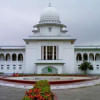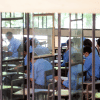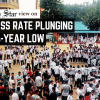Dissolution of textbook committee shows fault lines in reform drive

The row over the composition of a textbook revision coordination committee over the last few days has exposed a fault line in the government's ongoing reform drive, underscoring the challenges it faces as it prepares for more critical reforms, especially surrounding the question of religion in the constitution. On Saturday, the government dissolved the committee after facing backlash from certain groups for the lack of Islamic scholars in the 10-member committee and alleged "anti-religious" views held by its two members. The development, and the manner in which the authorities have acquiesced, underline a dilemma that has long plagued the state: how to balance progressive reforms with the expectations of religious constituencies that still hold significant sway.
The education adviser has denied the decision had anything to do with the pressure, stressing that there was no need for such a committee as specialists from both Islamic and general streams of education are "at the final stage of revising textbooks." But why form a committee then and disband it only after 13 days? The episode suggests that the government may be susceptible to yielding to conservative pressure in its reform initiatives. It also brought into focus the broader question about the role of religion in state affairs, with the fallen Awami League regime setting a trend of exploiting and appeasing fundamentalist elements for political gains. One may recall how pressure from religious groups led to the removal of certain stories and topics from school textbooks. Nothing much has changed even after the regime's ouster.
If we analyse the criticisms directed at the two Dhaka University teachers, it is clear that those had nothing to do with education or their qualifications, but only their perceived beliefs. Many have even indulged in a hate campaign online to the point that it sparked concerns about the safety of the teachers. Dissolving the committee, without critically evaluating the criticisms or doing nothing about those indulging in hate speech, also cast doubt about the government's commitment to such reforms. Are we to accept that any group can influence or reverse much-needed reforms through public agitation?
We must acknowledge the importance of ensuring a balanced and inclusive curriculum, one that reflects the cultural and religious diversity of the nation. But decisions on curriculum revisions must be based on academic merit and pedagogical principles, not political pressures. The government must realise that yielding to such pressures is contributing to an atmosphere where education is increasingly getting detached from the objective of nurturing critical thinking which it is supposed to do. We must not allow our education system to regress under the weight of such undue pressures any longer.


 For all latest news, follow The Daily Star's Google News channel.
For all latest news, follow The Daily Star's Google News channel. 










Comments